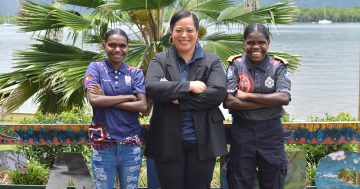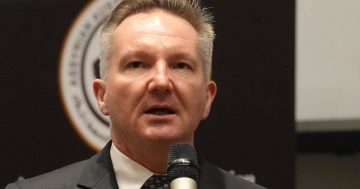Brian Trompeter* says at a recent forum women leaders were urged to work slowly and methodically for change and be prepared to confront obstacles.

Photo: Quentin Keller
If you want to bring about change at an organisation or Governmental Agency, work slowly and methodically and be prepared to confront anthills.
Actually, that last word wasn’t the first choice of Carmen Medina, an author and former US Central Intelligence Agency (CIA) Deputy Director, who substituted that last term for a vulgar, similar-sounding one used to describe obnoxious jerks.
Medina never could bring herself to use that term to such a person’s face, but urged women attending the Women’s Center’s 32nd annual Leadership Conference earlier this month not to sublimate their personalities and views at work.
“We’re not going to make progress as a society until women can bring their authentic selves to their leadership roles,” Medina said.
More than 700 people — nearly all of whom were women — attended the conference near Washington, DC.
This year’s theme was “Be the Change.”
Master of Ceremonies, Jasmin El Kordi recommended attendees remember “change” as an acronym meaning “Choose something and commit to it; Harness the power that comes with that choice; Act on that opportunity; do it with No doubt; welcome the Growth that comes with it; and Embrace such growth.”
The event featured speeches, panel discussions, awards presentations, personal-development sessions, networking and shopping opportunities with companies that donated a portion of the conference’s sales to the Women’s Center.
Margaret Huang, Executive Director of Amnesty International USA, told of her group’s efforts to end forced marriages of young girls in countries such as Burkina Faso in West Africa and decriminalise sex work in Latin America.
Amnesty International, which operates in 159 countries, also is fighting sexual harassment and online misbehaviour in the United States, she said.
Huang exhorted the crowd to take injustice personally, stand up for what’s right and work with others to bring about social change.
“We rarely accomplish big things without support from and collaboration with others,” she said.
Patrice D’Eramo of Cisco drew out the views of three panelists during a discussion about change.
Jayne Fleming, human-rights team leader at the law firm of Reed Smith LLP, told of losing her father in an airplane crash when she was 11 and finding her way in life as first an actress, then as a lawyer.
“Be part of something bigger and have a responsibility and role in the world,” Fleming advised.
Stefanie Zeldin Sigal, co-founder of In2green, touched on the need to find work–life balance, but acknowledged things only seem balanced in retrospect.
Tamika Tremaglio, Greater Washington Principal at Deloitte, warned conference attendees not to succumb to self-doubt and the “impostor syndrome,” where one feels like a fraud in one’s role.
She urged the crowd to write a letter with advice to their younger selves.
Tremaglio’s own letter advised creating one’s own personal brand, choosing a true life partner and being brave.
“One day, this will all seem worth it,” her letter read.
The audience gave some of its heartiest responses to Medina.
Medina recalled growing up terrified in the house of her hard-drinking Army sergeant father, who sometimes beat her and her mother.
The upbringing gave her highly sensitive emotional awareness — something she later learned a lot of entrepreneurial thinkers have.
Early in her CIA career, Medina pushed the radical idea of harnessing the Internet’s capabilities to further the Agency’s mission.
But she ran into strong bureaucratic resistance and was reassigned to a lateral position she loathed.
Medina later left the Intelligence Agency, but returned with a different outlook and was able to implement her strategies.
When hiring, Medina said she tried to avoid candidates who were too practised and smooth.
“Crunchiness has its own virtues,” she said.
Institutional change is hard to bring about, even if one is in a position of high authority, Medina said.
Those who think differently should prepare to struggle and avoid becoming cynical.
Medina recommended that such path-blazers try being silent for three consecutive meetings and then introduce only one new idea at the end of the next three gatherings, she said.
“If you’re the smartest person in the room, it’s up to you to make the interaction productive,” she said.
* Brian Trompeter is a reporter at Sun Gazette Newspapers in Washington, DC.
This article first appeared at www.insidenova.com.











